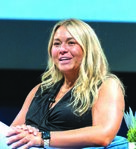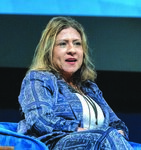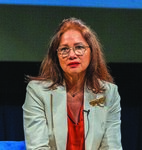


The Greensboro Chamber and East Greensboro NOW hosted The Accelerate Economic Equity Summit + Opportunity Fair on July 18 at North Carolina A&T State University.
Sponsored by Cone Health and Bank of America, this daylong seminar invited the business community to learn about the importance of purposeful, targeted diversity, equity, and inclusion efforts and to expose ethnic minority-owned firms in the region to contract opportunities with large companies, public institutions and municipalities.
The day began at Harrison Auditorium, with a panel of business owners and professionals who discussed the challenges in raising capital, finding minority vendors, economic equity in the region and the importance of MBE (Minority Business Enterprise) certification and opportunities.
MBE Certification opens doors to government contracts specifically designated for minority-owned businesses. Government agencies are often mandated to allocate a certain percentage, typically five percent to 25 percent, of their procurement budgets to MBEs.
Greensboro Chamber of Commerce Accelerate Greensboro’s new Equity Impact Pledge initiative addresses minority participation. Companies are being asked to make a commitment to economic equity by signing the pledge to spend at least $30,000 per month on cumulative projects smaller than $30,000, on the use of MBE contractors and suppliers. Accelerate Greensboro will help in matching companies with qualified MBE vendors in the region. Accelerate Greensboro connects minority-owned suppliers with companies in need of their services and offers programs to help small business owners learn how to grow their businesses.
The panel was moderated by Felicia Woodard, NC Triangle & Triad’s Business Banking Market Executive for Bank of America, who opened the discussion with the challenges small businesses face right at startup is raising capital.
Leah Wyrick, owner of Three Strands Recovery Wear, a business that makes surgical recovery garments for breast cancer patients, noted that an accelerator program, much like Accelerate Greensboro, helped her get funds through investors and grants.
“From the moment I started my business, I got funding from the Wake Forest Business School to get my business off the ground. I joined an accelerator business program in Winston-Salem and raised about $200,000 through the accelerator programs,” said Wyrick adding that young entrepreneurs in particular should take advantage of those programs.
For larger organizations, such as nonprofits, raising capital is seen as more of a long term issue, said Maria Garza, CEO of East Coast Migrant Head Start Project (ECMHSP) a nonprofit that provides early childhood education, adult education programs and other services to migrant farmworkers and their children.
“For a nonprofit, it doesn’t matter how much you have to operate, you probably actually need 10 times more,” said Garza. “So, it makes sense that as a nonprofit that we look for the vendors that we need with the best price. We are very intentional to look for minority vendors and help them succeed. It’s not charity, it’s opportunity.”
Angelica Thacker, CEO of PINAM Construction, added that access to opportunities is another challenge of being a small minority owned business. A native of Texas, and the child of migrant farmers, Thacker thanked Garza for her organization’s dedication to providing services for the children of migrant workers, because she was one of those children who benefited from ECMHSP’s programs.
With 25 years of construction experience, from construction laborer to business owner under her belt, Thacker stated that Hispanics make up about 80 percent of the construction workforce in the U.S., however, the number of Hispanic owners is less, and the number of Hispanic women owners is even smaller.
“Not only did I have to face a male dominated industry, but I had to face my culture as well. Not following a traditional “woman” job,” she said adding that one of the things that helped PINAM Construction grow was by registering as a Historically Underutilized Business (HUB) with the state.
Diversity certifications, such as a HUB or MBE, should be the next priority after raising capital, said Kevin Price, president and CEO of the National Institute of Minority Development in Durham, N.C.
“That is documentation for who you say you are. I would encourage businesses to get those. If you’re going to do business with corporations then that is the top tier of certifications. That’s your license to hunt, it’s not a meal ticket. You still have to do the work that helps open the door to have those conversations and make those connections,” said Price.
Following the opening panel, the day continued at the Alumni-Foundation Event Center, with a Triad Business Journal (TBJ) Leaders in Diversity Panel, accompanying lunch. Later in the afternoon, participants attended two tracks of workshops offered at the Alumni-Foundation Event Center: One track for HR, DEI, business partners and administrative professionals, to address equity in the workplace. The other track was for minority-owned businesses, covering topics such as financing, strategic and succession planning, and procurement.
The day culminated with The Minority Business Opportunity Fair from 4 p.m. to 6 p.m. in Corbett Sports Center at NCA&T where companies with contracting opportunities and/or supplier diversity goals could network and also find additional business resources.